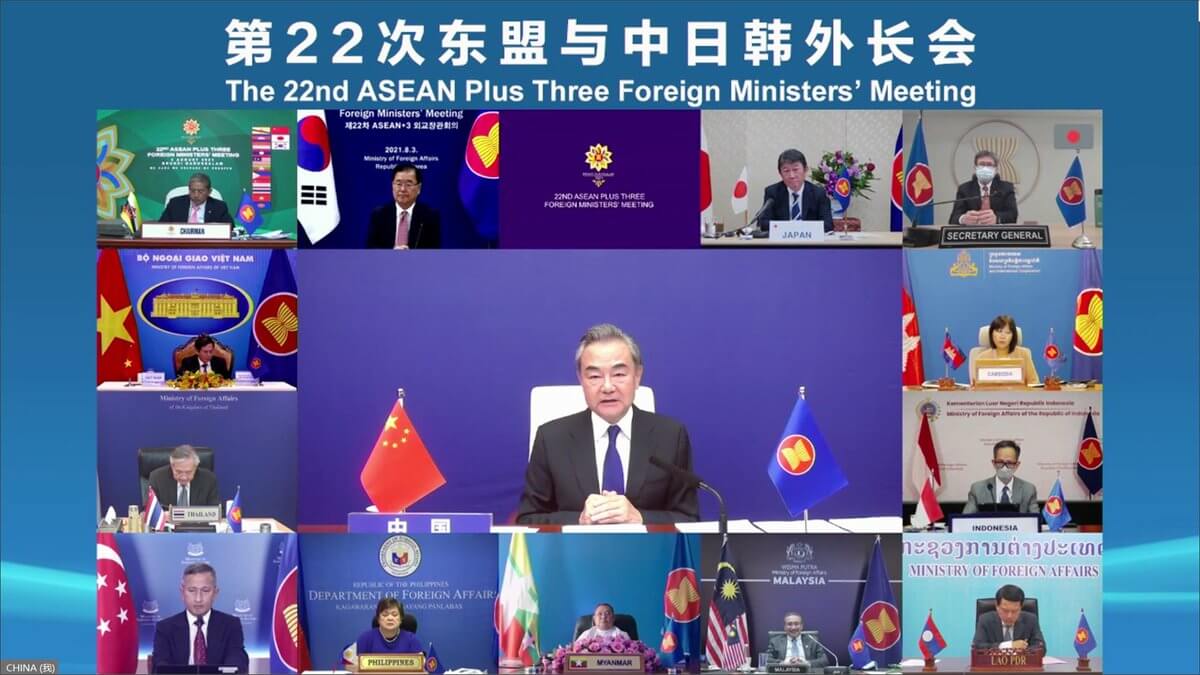This week, the Association of Southeast Asian Nations (ASEAN) held meetings with the United States (US), China, South Korea, Japan, and Vietnam. It included the East Asia Summit on Wednesday and the ASEAN+3 Summit on Tuesday.
US Secretary of State Antony Blinken spoke with foreign ministers (FMs) of ASEAN nations and ASEAN Secretary-General Lim Jock Hoi from Brunei during Tuesday’s US-ASEAN Foreign Ministers’ Meeting. According to a press release by the US Department of State, Blinken reaffirmed the US’ commitment to ASEAN centrality and support for the ASEAN Outlook on the Indo-Pacific that is part of the US vision for a Free and Open Indo Pacific (FOIP). The diplomats also discussed international challenges, including combating the COVID-19 pandemic, acting on the climate crisis, strengthening human capital development, and the urgency of action on Myanmar.
Blinken announced the US’ plan to provide $500,000 to the ASEAN COVID-19 Response Fund, which will support the purchase of vaccines. He said the US would continue helping the ASEAN Secretariat develop an ASEAN Public Health Emergency Coordination System. The release mentioned that Blinken highlighted the US’ support for reliable and sustainable energy systems in ASEAN and the work of the US-ASEAN Smart Cities Partnership in addressing urbanisation challenges in transport, water, energy, and health.
The group’s FMs also met their Japanese and Vietnamese counterparts, Motegi Toshimitsu and Bui Thanh Son, on the same day. Motegi said Japan intends to overcome the COVID-19 crisis with ASEAN by providing healthcare and medical support, vaccines, and assistance to the ASEAN Comprehensive Recovery Framework.
Motegi also strongly opposed the “unilateral attempts to change the status quo by force in the East and South China Seas,” which continues with increasing intensity by China. In response, ASEAN agreed on the importance of the freedom of navigation and overflight in the South China Sea, demilitarisation, and peaceful resolution of disputes as per international law, particularly the United Nations Convention on the Law of the Sea (UNCLOS).
On Tuesday, South Korean FM Chung Eui-Yong also attended the 24th ASEAN-South Korea Foreign Ministers’ Meeting as a co-chair. Both sides recognised the importance of creating a favourable environment in the region for free trade and investment, agreed to make efforts for an early entry into force of the Regional Comprehensive Economic Partnership (RCEP), and the liberalisation of the ASEAN-ROK Free Trade Agreement (FTA).
ASEAN also met the Chinese State Councilor and FM Wang Yi on the same day. Wang noted that this year marks the 30th anniversary of the establishment of dialogue between China and ASEAN. He said the partnership should focus on deepening anti-pandemic cooperation, promoting economic recovery, consolidating the existing regional cooperation frameworks, and maintaining peace and stability in the South China Sea.
In response, the ASEAN FMs said they would continue to deepen cooperation with China and build capacity in connectivity, disaster prevention and relief, sustainable development and digital transformation. They also reaffirmed ASEAN’s willingness to uphold a rules-based free trade system and regional economic integration with China.
ASEAN Holds Ministerial Meetings With United States, China, South Korea, and Japan
This week, the Association of Southeast Asian Nations held joint and individual meetings with its +3 partners, China, South Korea, and Japan. The group also met the US officials.
August 6, 2021

SOURCE: FMPRC
